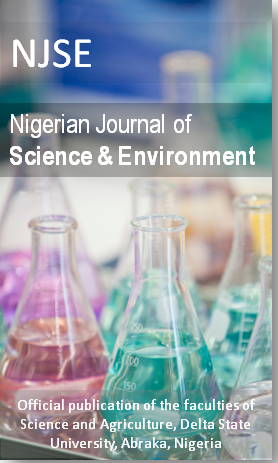
NIGERIAN JOURNAL OF SCIENCE AND ENVIRONMENT
Journal of the Faculties of Science and Agriculture, Delta State University, Abraka, Nigeria
ISSN: 1119-9008
DOI: 10.5987/UJ-NJSE
Email: njse@universityjournals.org
IMPACT OF OIL EXPLORATION AND EXPLOITATION ON THE NIGER DELTA REGION: ENVIRONMENTAL PERSPECTIVE
DOI: 10.5987/UJ-NJSE.17.074.1 | Article Number: AFF53E12 | Vol.11 (1) - September 2012
Author: Nnabuenyi U. M.
Keywords: Environmental Degradation, Oil Exploration, Oil Spillage, Economic Multiplier Effects, Integrated Development Strategy
Since the discovery of oil in Nigeria in 1956, the country has been suffering the negative environmental consequences of oil exploration and exploitation. Between 1976 and 1996 a total of 4647 incidents resulted in the spill of approximately 2,369,470 barrels of oil into the environment. In addition, between 1997 and 2001, Nigeria also recorded a total number of 2,097 oil spill incidents. In 1998, 40,000 barrels of oil from Mobil platform off the Akwa Ibom coast were split into the environment causing severe damage to the coastal environment. Several oil spill management policy and efforts are in place to reduce the menace of oil spill incidents in the country. Some of these policies and efforts were made by the Federal Government, Non governmental agencies and oil firms in the country. The use of oil trajectory and fat e-models is also incorporated in oil spill management policy in the country. The results from a hypothetical simulation with the model from a point around OPL 250 located about 150km off the Nigerian coastline shows that the simulated oil spill for wet season reached the shore around Penington River after 104hours, about 4.5 days. Also during the dry season, the results from the model indicate that the oil spill reached the shore at the entrance of Benin River after 162 hours, 6.5days. This paper examines the impact of oil exploration and exploitation which encompasses environmental degradation, social annihilation, and economic impoverishment in the Nigeria’s Niger-Delta and the emerging socio-economic multiplier effects on the people of the region. The study employed tables and as well as percentages forms of statistical analysis. Data for the study were mainly secondary sources extracted from the National Bureau of Statistics (NBS) and the United Nations Development Programmes report. The study revealed that the emerging social disorder and HIV/AIDS prevalence in the region is as a result of the social and economic multiplier effects such as unemployment and high level of poverty. The study then recommends an integrated community based approach involving commitment from all stakeholders.
Aaron, K. K. (2006). Human Rights Violation and Environmental Degradation in the
Niger- Delta. In: Activating Human Rights (Porter, E and Offord, B Eds.), Peter Long, Oxford, Borne, New York, Pg 193-215.
Akpofure, E. A. (2008). Oil Spillage in the Nigeria’s Niger-Delta. Psychomorphological and Empirical Overview, International Association of Impact Assessment, Opulence Environmental Service Ltd.
Aluko, M. A. O. (2004). Sustainable Development, Environmental Degradation and the Entrenchment of Poverty in the Niger-Delta of Nigeria; Kamla-Ra. Journal of Human Ecology 15 (1): 63-68.
Bisina, J. (2006). Environmental Degradation in the Niger-Delta (Unpublished).
Eregha, P. B. (2001). The Socio-economic Effects of Unemployment Among University
Graduates in Nigeria. Unpublished B.Sc (Ed.) Project. University of Ado-Ekiti, Nigeria.
Eregha, P.B. and Irughe, I.R. (2009). Oil induced environmental degradation in the Nigeria’s Niger Delta: the multiplier effects. Journal of Sustainable Development in Africa 11 (4): 160-175
Gabriel, A. O. (2007). Women in the Niger-Delta. Environmental Issues and Challenges in the third Millennium, cited in Egbe, R.E. (2010) Environmental challenges of oil spillage for families in oil producing communities of the Niger Delta region. JHER 13: 24-34.
IPCC (2007). Climate Change: Synthesis Report. Cambridge University Press, Cambridge.
Nwilo, P.C. and Badejo, O.T. (2006). Oil spill problems and management in the
Niger-Delta. International Oil Spill Conference, Miami, Florida
Ofehe, S. (1999). Hope for the Niger-Delta. The Netherlands. HNDC.
Oil Spill Intelligent Report (1978). How does it spill? Arlington, MA.USA. (www.waado.org).
Okoh, R. N. and Egbon, P. C. (1999). Fiscal Federalism and Revenue Allocation. The
Poverty of the Niger-Delta. In: Fiscal federalism and Nigeria’s Economic Development
Selected Papers of the 1999 Annual Conference of the Nigerian Economic Society (Aigbokhan, B.E. Ed) NES, Ibadan.
Omofonmwan, S. I. and Odia, L. O. (2009). Oil Exploitation and Conflict in the Niger-
Delta Region of Nigeria. Kamla-Raj. Journal of Human Ecology 26(1): 25-30.
Opukri, C. O and Ibaba, S. I. (2008). Oil Induced Environmental Degradation and
Internal Population Displacement in the Nigeria’s Niger-Delta. Journal of Sustainable
Development in Africa 10 (1):173-193
Osuji, L. C. and Ukale, E. E. (2000). Postoil Spill Fire at Ugbomro (Niger-Delta): A New Vista in Soil-Pollution Studies. Port-Harcourt. Petroleum Chemical Research Group.
United Nations Development Report (UNDP) (2006). Niger-Delta Development Human Report. United Nations Development Programme, Abuja.
United Nations Population Fund (UNFPA) (2002). Preventing HIV infection, promoting reproductive health: UNFPA response. United Nations Population Fund, New York.
Uyigue, E. and Agho, M. (2007). Coping with Climate Change and Environmental
Degradation in the Niger-Delta of South Nigeria. Community Research and Development Centre (CREDC), Benin.
Zabbey, N. (2004). Impacts of Extractive Industries on the Biodiversity on the Niger-Delta Region, Nigeria. Centre for Environment, Human Rights and Development, Eleme.
